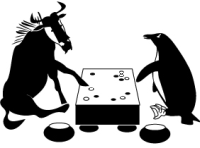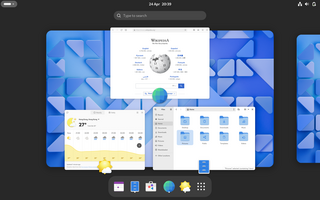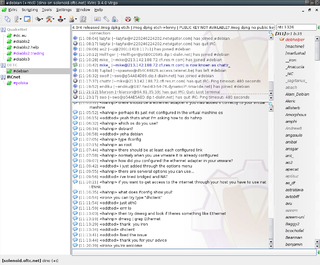
An operating system (OS) is system software that manages computer hardware and software resources, and provides common services for computer programs.

In computing, a windowing system is a software suite that manages separately different parts of display screens. It is a type of graphical user interface (GUI) which implements the WIMP paradigm for a user interface.
The Universal Chess Interface (UCI) is an open communication protocol that enables chess engines to communicate with user interfaces.

GNU Go is a free software program by the Free Software Foundation that plays Go. Its source code is quite portable, and can be easily compiled for Linux, as well as other Unix-like systems, Microsoft Windows and macOS; ports exist for other platforms.

In computer chess, a chess engine is a computer program that analyzes chess or chess variant positions, and generates a move or list of moves that it regards as strongest.

Scanner Access Now Easy (SANE) is an open-source application programming interface (API) that provides standardized access to any raster image scanner hardware. The SANE API is public domain. It is commonly used on Linux.
Chess is a two-player board game.

Linux is a family of open-source Unix-like operating systems based on the Linux kernel, an operating system kernel first released on September 17, 1991, by Linus Torvalds. Linux is typically packaged as a Linux distribution (distro), which includes the kernel and supporting system software and libraries, many of which are provided by the GNU Project. Many Linux distributions use the word "Linux" in their name, but the Free Software Foundation uses and recommends the name "GNU/Linux" to emphasize the use and importance of GNU software in many distributions, causing some controversy.
Computer shogi is a field of artificial intelligence concerned with the creation of computer programs which can play shogi. The research and development of shogi software has been carried out mainly by freelance programmers, university research groups and private companies. By 2017, the strongest programs were outperforming the strongest human players.

Smuxi is a cross-platform IRC client for the GNOME desktop inspired by Irssi. It pioneered the concept of separating the frontend client from the backend engine which manages connections to IRC servers inside a single graphical application.

Ubuntu One is an OpenID-based single sign-on service operated by Canonical Ltd. to allow users to log onto many Canonical-owned Web sites. Until April 2014, Ubuntu One was also a file hosting service and music store that allowed users to store data "in the cloud".

SecureCRT is a commercial SSH and Telnet client and terminal emulator by VanDyke Software. Originally a Windows product, VanDyke later added a Mac OS X version in 2010 with release v6.6 and a Linux version in 2011 with release v6.7.

GNOME, originally an acronym for GNU Network Object Model Environment, is a free and open-source desktop environment for Linux and other Unix-like operating systems.

KVIrc is a graphical IRC client for Linux, Unix, Mac OS and Windows. The name is an acronym of K Visual IRC in which the K stands for a dependency to KDE, which became optional from version 2.0.0. The software is based on the Qt framework and its code is released under a modified GNU General Public License.

Zorin OS is a Linux distribution based on Ubuntu. It uses a GNOME 3 and XFCE 4 desktop environment by default, although the desktop is heavily customized in order to help users transition from Windows and macOS easily. Wine and PlayOnLinux are supported, allowing users to run compatible Windows software, like Microsoft Office. Its creators maintain three free editions of the operating system, and sell a professional edition.

Windows Subsystem for Linux (WSL) is a feature of Microsoft Windows that allows developers to run a Linux environment without the need for a separate virtual machine or dual booting. There are two versions of WSL: WSL 1 and WSL 2. WSL is not available to all Windows 10 users by default. It can be installed either by joining the Windows Insider program or manually via Microsoft Store or Winget.

Fairy-Max is a free and open source chess engine which can play orthodox chess as well as chess variants. Among its features is the ability of users to define and use their own custom variant chess pieces for use in games.














